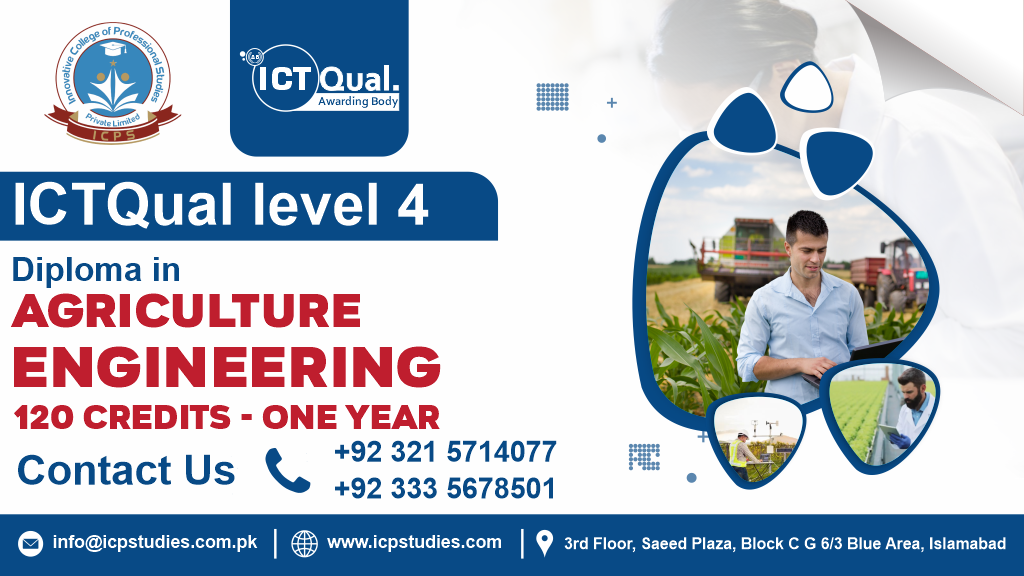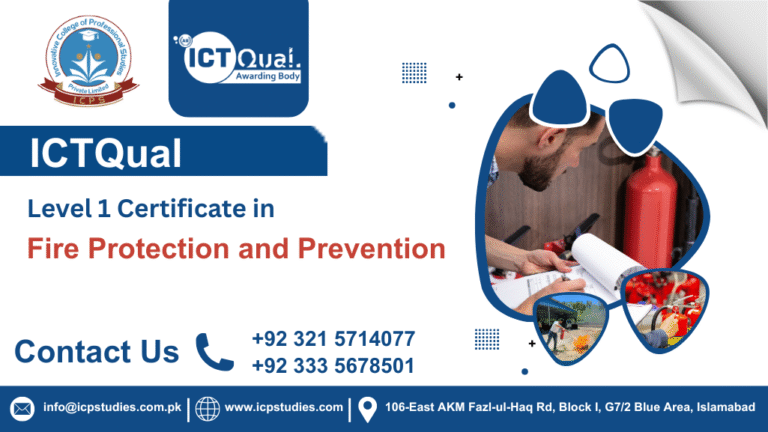Introduction: The ICTQual Level 4 Diploma in Agricultural Engineering (120 credits) is a comprehensive one-year course designed to equip students with the technical expertise and practical skills needed to excel in the ever-evolving agricultural engineering sector. This diploma focuses on developing advanced knowledge in agricultural machinery, technology integration, and sustainable practices. It is ideal for those wishing to pursue careers in agricultural engineering, machinery design, and agricultural innovation.
Course Overview: The ICTQual Level 4 Diploma in Agricultural Engineering offers a specialized pathway for individuals to deepen their understanding of the principles of agricultural engineering. With a focus on modern agricultural practices and technologies, the course addresses the growing demand for skilled professionals capable of applying engineering solutions to the agriculture industry. Spanning one year, this qualification combines theoretical study with hands-on experience, preparing students for a rewarding career in a vital sector.
Learning Outcomes: Upon successful completion of this course, students will:
- Understand the core principles of agricultural engineering, including machinery operation, maintenance, and design.
- Be able to apply advanced engineering concepts to solve practical challenges in the agricultural sector.
- Gain proficiency in using modern technologies and automation in agricultural systems.
- Develop skills in sustainable agricultural practices, ensuring environmental and economic sustainability.
- Be prepared to take on managerial and technical roles in agricultural engineering projects.
- Master the ability to critically evaluate agricultural systems and recommend improvements to enhance efficiency and productivity.
- Study Units: The ICTQual Level 4 Diploma in Agricultural Engineering covers a range of technical and practical units, including:
- Agricultural Machinery Systems – An in-depth study of agricultural machinery used in modern farming, including their design, operation, and maintenance.
- Soil and Water Management – Techniques and technologies for improving soil health and water efficiency in agricultural operations.
- Renewable Energy in Agriculture – Exploration of renewable energy sources like solar, wind, and bioenergy to improve sustainability in agricultural systems.
- Engineering in Crop Production – Application of engineering principles to optimize crop production through machinery and technology.
- Precision Agriculture – Study of data-driven farming methods using GPS and sensor technology to enhance productivity.
- Agricultural Automation and Robotics – The role of automation and robotics in increasing efficiency and reducing labor in the agricultural sector.
- Health and Safety in Agricultural Engineering – Important safety protocols, risk assessments, and best practices to ensure a safe working environment in agricultural engineering.
- Sustainable Farming Practices – Exploration of sustainable techniques and technologies to reduce environmental impact while maintaining high production levels.
Course Benefits:
- Industry-Relevant Skills: The course provides specialized knowledge applicable to the rapidly evolving agricultural sector, ensuring that graduates are ready to meet industry demands.
- Career Advancement: With 120 credits, the qualification opens doors to a variety of roles, from machinery management to engineering design and farm operations.
- Hands-On Learning: Combining theory with practical applications allows students to gain real-world experience that can be directly applied to their future careers.
- Professional Recognition: This diploma is widely recognized by employers within the agricultural and engineering sectors, providing students with a competitive edge.
- Sustainability Focus: Students are equipped with skills to contribute to sustainable agricultural practices, which is crucial as the industry faces challenges such as climate change and resource management.
Who is This Course For? The ICTQual Level 4 Diploma in Agricultural Engineering is ideal for individuals who:
- Have a keen interest in agricultural engineering and wish to advance their skills.
- Are working in the agricultural sector and want to enhance their technical knowledge.
- Have a background in engineering or agriculture and want to specialize in agricultural engineering.
- Aspiring professionals looking to enter the agricultural industry with a technical qualification.
- Employers looking to upskill their workforce in agricultural engineering technologies.
The ICTQual Level 4 Diploma in Agricultural Engineering (120 credits) is a perfect opportunity for those seeking a career in the agricultural industry, offering a thorough understanding of modern agricultural systems, technologies, and practices. By completing this course, students will gain not only technical expertise but also the practical skills needed to drive innovation and sustainability in agriculture, making them highly attractive to employers in this growing sector.
All About ICTQual Level 4 Diploma in Civil Engineering 120 Credits – One Year
Course Overview
The ICTQual Level 4 Diploma in Agricultural Engineering (120 Credits) is a one-year, specialized qualification designed to equip individuals with the technical skills and in-depth knowledge necessary for a successful career in agricultural engineering. As the agricultural industry continues to evolve, driven by advancements in technology and the need for sustainable practices, skilled professionals are in high demand. This diploma provides a solid foundation in the principles of agricultural engineering, including machinery systems, precision agriculture, and renewable energy solutions.
Throughout the course, students will gain practical insights into modern agricultural practices, while developing the problem-solving and technical expertise needed to design, maintain, and optimize agricultural machinery and systems. With a focus on sustainability and technological innovation, this course prepares students to meet the challenges of a dynamic industry, opening doors to diverse career opportunities in agricultural engineering, machinery design, and farm management.
Study Units
- Introduction to Agricultural Engineering
- Engineering Principles for Agriculture
- Farm Machinery Design and Operation
- Soil and Water Management
- Agricultural Irrigation Systems
- Agricultural Structures and Buildings
- Automation in Agricultural Engineering
- Renewable Energy in Agriculture
- Agricultural Waste Management
- Health, Safety, and Environmental Management in Agriculture
- Agricultural Equipment Maintenance and Repair
- Project Management in Agricultural Engineering
To enroll in the ICTQual Level 4 Diploma in Agricultural Engineering (120 Credits), applicants must meet the following entry requirements:
- Educational Background:
- A minimum of a Level 3 qualification in a related field such as Agricultural Engineering, Mechanical Engineering, or another relevant technical discipline.
- Alternatively, applicants with a general secondary education (such as A-levels or equivalent) may be considered if they have a strong interest in agricultural technology and engineering.
- Work Experience:
- While not mandatory, prior work experience in the agricultural or engineering sector is highly beneficial and may strengthen an applicant’s application.
- Mathematical and Analytical Skills:
- Basic proficiency in mathematics is required, as the course involves technical calculations and problem-solving related to agricultural engineering systems.
- English Language Proficiency:
- Applicants must have a good understanding of the English language, both written and spoken, as the course content is delivered in English. If English is not the applicant’s first language, proof of English language proficiency (such as IELTS or TOEFL) may be required.
- Motivation and Commitment:
- A strong interest in agricultural engineering, technology, and sustainability, along with the ability to commit to a one-year, full-time or part-time study program.
Applicants who do not meet all the entry requirements may still be considered for admission based on relevant work experience or other qualifications, subject to approval by the admissions team.
The ICTQual Level 4 Diploma in Agricultural Engineering (120 Credits) is designed for individuals who are passionate about agricultural technology and engineering, and who wish to develop the skills and knowledge required to excel in this dynamic industry. This course is ideal for:
- Aspiring Agricultural Engineers:
- Individuals looking to enter the agricultural engineering field with a solid, industry-recognized qualification.
- Professionals in the Agricultural Sector:
- Those already working in farming, agriculture, or machinery-related roles who want to enhance their technical expertise and career prospects in agricultural engineering.
- Mechanical or Civil Engineers:
- Engineers seeking to specialize in agricultural systems, machinery, or sustainable agricultural practices.
- Technically Inclined Individuals with an Interest in Agriculture:
- Anyone with a strong interest in applying engineering principles to improve agricultural practices, machinery, and technology.
- Managers and Supervisors in Agricultural Operations:
- Individuals in managerial or supervisory roles who wish to expand their technical knowledge of agricultural machinery, automation, and sustainable farming methods to improve operational efficiency.
- Career Changers:
- Those looking to transition into the agriculture industry from other sectors, with a background in engineering, technology, or related fields.
This course is designed for motivated individuals who are eager to contribute to the development of sustainable, efficient, and innovative agricultural systems. Whether you’re aiming to work in machinery design, precision farming, or renewable energy applications in agriculture, this diploma offers the expertise needed to advance your career in this exciting field.
Learning Outcomes
- Introduction to Agricultural Engineering
- Understand the role of agricultural engineering in enhancing modern farming systems.
- Recognize the evolution of agricultural machinery and technological advancements.
- Explain how engineering contributes to increased farm productivity and sustainability.
- Engineering Principles for Agriculture
- Apply core engineering principles, such as mechanics and thermodynamics, to agricultural systems.
- Analyze and address practical challenges in machinery and equipment design within agriculture.
- Understand fundamental physics laws that govern agricultural processes.
- Farm Machinery Design and Operation
- Identify different types of farm machinery and understand their functions.
- Demonstrate knowledge of design considerations when developing agricultural machinery.
- Assess and optimize the efficiency and operational techniques of farm machinery to enhance performance.
- Soil and Water Management
- Understand the principles of soil health and its importance for sustainable farming.
- Develop strategies for the efficient use of water in agricultural operations.
- Implement soil and water management practices that boost crop yields while minimizing environmental impacts.
- Agricultural Irrigation Systems
- Design and evaluate various irrigation systems tailored to different agricultural production needs.
- Analyze water distribution methods and their effect on crop growth.
- Troubleshoot and optimize irrigation systems for maximum water efficiency and agricultural productivity.
- Agricultural Structures and Buildings
- Identify the key design elements and construction techniques for agricultural buildings and infrastructure.
- Assess structural requirements for agricultural operations, including storage, livestock housing, and machinery facilities.
- Understand materials and construction methods used to create durable agricultural buildings.
- Automation in Agricultural Engineering
- Understand the role of automation and robotics in improving farm efficiency and productivity.
- Evaluate the use of smart technologies like drones, sensors, and AI in agricultural applications.
- Implement automated systems for tasks such as crop monitoring, harvesting, and data collection.
- Renewable Energy in Agriculture
- Identify renewable energy sources suitable for agricultural applications, such as solar, wind, and bioenergy.
- Design and implement renewable energy solutions to reduce environmental impact and operational costs.
- Assess the potential for integrating renewable energy technologies into modern agricultural systems.
- Agricultural Waste Management
- Apply sustainable methods for managing agricultural waste, both organic and inorganic.
- Develop waste management practices that reduce environmental harm and support recycling initiatives.
- Implement strategies for composting, converting waste to energy, and safely disposing of agricultural by-products.
- Health, Safety, and Environmental Management in Agriculture
- Understand and apply health and safety regulations in agricultural engineering.
- Conduct risk assessments to identify and mitigate hazards in agricultural work environments.
- Develop environmental management plans that promote safe and sustainable farming practices.
- Agricultural Equipment Maintenance and Repair
- Perform maintenance and troubleshooting on agricultural machinery and equipment.
- Apply preventive maintenance best practices to minimize downtime and extend equipment lifespan.
- Diagnose and repair faults in agricultural equipment, ensuring reliability and optimal performance.
- Project Management in Agricultural Engineering
- Apply project management principles to plan, execute, and oversee agricultural engineering projects.
- Develop project timelines, budgets, and resource allocation plans for agricultural engineering initiatives.
- Monitor project progress, manage risks, and ensure the successful completion of engineering projects in agriculture.
FAQs about ICTQual Level 4 Diploma in Agriculture Engineering 120 Credits – one year







